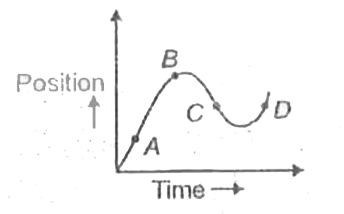The instantaneous velocity of a particle is equal to time derivative of its position vector and the instantaneous acceleration is equal to time derivatives of its velocity vector. Therefore :
the instantaneous velocity depends on the instantaneous position vecoty
instantaneous acceleration is independent of instantaneous position vector and instantaneous velocity
instantaneous acceleration is independent of instantaneous position vector but depends on the instantaneous velocity
instantaneous acceleration depends both on the instataneous position vector and the instantaneous velocity.
The correct Answer is:C
To solve the problem, we need to analyze the statements regarding instantaneous velocity and instantaneous acceleration in relation to the position vector and velocity vector of a particle.
1. Understanding Instantaneous Velocity:
- The instantaneous velocity v of a particle is defined as the time derivative of its position vector r:
v=drdt
- This means that velocity is related to how the position vector changes with time.
2. Understanding Instantaneous Acceleration:
- The instantaneous acceleration a of a particle is defined as the time derivative of its velocity vector v:
a=dvdt
- This indicates that acceleration is related to how the velocity vector changes with time.
3. Analyzing the Options:
- Option 1: "Instantaneous velocity depends on the instantaneous position vector."
- This statement is incorrect because instantaneous velocity is derived from the position vector but does not depend directly on its value at any instant. It depends on how the position changes over time (the derivative).
- Option 2: "Instantaneous acceleration is independent of instantaneous position vector and instantaneous velocity."
- This statement is also incorrect. Acceleration depends on the instantaneous velocity (as shown in the definition of acceleration) and is not independent of it.
- Option 3: "Instantaneous acceleration is independent of instantaneous position vector but depends on instantaneous velocity."
- This statement is correct. Acceleration is related to how velocity changes over time and does not depend on the position vector directly.
- Option 4: "Instantaneous acceleration depends on both the instantaneous position vector and instantaneous velocity."
- This statement is incorrect because, as established, acceleration does not depend on the instantaneous position vector.
4. Conclusion:
- The only correct statement is Option 3: "Instantaneous acceleration is independent of instantaneous position vector but depends on instantaneous velocity."
- The instantaneous velocity v of a particle is defined as the time derivative of its position vector r:
v=drdt
- This means that velocity is related to how the position vector changes with time.
- The instantaneous acceleration a of a particle is defined as the time derivative of its velocity vector v:
a=dvdt
- This indicates that acceleration is related to how the velocity vector changes with time.
- Option 1: "Instantaneous velocity depends on the instantaneous position vector."
- This statement is incorrect because instantaneous velocity is derived from the position vector but does not depend directly on its value at any instant. It depends on how the position changes over time (the derivative).
- Option 2: "Instantaneous acceleration is independent of instantaneous position vector and instantaneous velocity."
- This statement is also incorrect. Acceleration depends on the instantaneous velocity (as shown in the definition of acceleration) and is not independent of it.
- Option 3: "Instantaneous acceleration is independent of instantaneous position vector but depends on instantaneous velocity."
- This statement is correct. Acceleration is related to how velocity changes over time and does not depend on the position vector directly.
- Option 4: "Instantaneous acceleration depends on both the instantaneous position vector and instantaneous velocity."
- This statement is incorrect because, as established, acceleration does not depend on the instantaneous position vector.
- The only correct statement is Option 3: "Instantaneous acceleration is independent of instantaneous position vector but depends on instantaneous velocity."
Topper's Solved these Questions
- DAILY PRACTICE PROBLEMSBOOK - RESONANCE ENGLISHCHAPTER - DAILY PRACTICE PROBLEMSEXERCISE - DPP NO. 14 PHYSICS
10 Videos
- DAILY PRACTICE PROBLEMSBOOK - RESONANCE ENGLISHCHAPTER - DAILY PRACTICE PROBLEMSEXERCISE - dpp 15
8 Videos
- DAILY PRACTICE PROBLEMSBOOK - RESONANCE ENGLISHCHAPTER - DAILY PRACTICE PROBLEMSEXERCISE - Dpp no 12 Physics
8 Videos
- CURRENT ELECTRICITYBOOK - RESONANCE ENGLISHCHAPTER - CURRENT ELECTRICITYEXERCISE - Exercise
53 Videos
- ELASTICITY AND VISCOCITYBOOK - RESONANCE ENGLISHCHAPTER - ELASTICITY AND VISCOCITYEXERCISE - Advanced Level Problems
9 Videos
Similar Questions
The instantaneous speed is always equal to the magnitude of instantaneous velocity. Why?
View SolutionAssertion: The average velocity of a particle is zero in a time interval. It is possible that the instantaneous acceleration is never zero in the interval.
Reason: The magnitude of average velocity in an interval is equal to its average speed in that interval.
View SolutionThe average velocity of a particle moving on a straight line is zero in a time interval.
Assertion :− It is possible that the instantaneous acceleration is never zero in the interval.
Reason :− It is possible that the instantaneous velocity is never zero in the interval.
View Solution(A):The Instantaneous velocity does not depend on instantaneous position vector.
(R ):The instantaneous velocity and average velocity of a particle are always same.
View SolutionAssertion: In general |Displacement| ≤ distance.
Reason: The instantaneous speed is equal to the magnitude of the instantaneous velocity,
View SolutionExplain the terms , velocity and instantaneous velocity. When are they equal?
View SolutionIf a particle moves in a circle describing equal angles in equal intervals of time, then the velocity vector.
View SolutionIf the uncertainty in the position of a particle is equal to its de-Broglie wavelength, the minimum uncertainty in its velocity should be
View SolutionThe position- time graph of a moving particle is shown. The instantaneous velocity of the particle is negative at the point

View SolutionIf the object is moving with uniform velocity in a given interval of time, then the average speed and instantaneous velocity are equal, why?
View Solution
